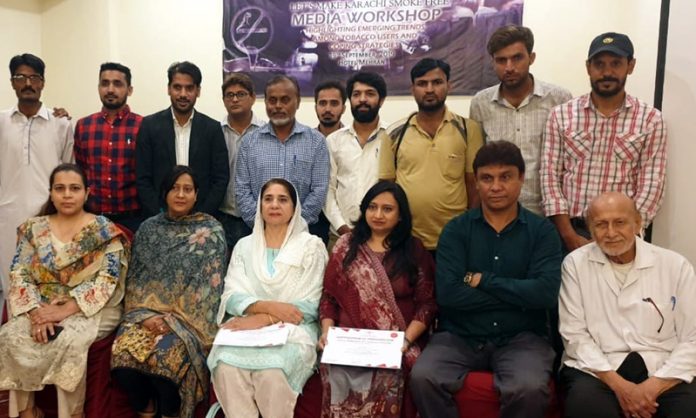KARACHI: Society for the Protection of the Rights of Child (SPARC) held a media orientation on impact of tobacco smoking on children at a local hotel on Thursday.
The aim of the workshop was to uplift awareness of working journalists and reporters on tobacco to work together to make Karachi smoke free city.
Karachi Press Club (KPC) President Imtiaz Khan Faran said that media is a tool of change and in recent past it had played a strong role in bring positive change in the society.
He highlighted the crucial role of anti-smoking campaign reducing the health risks in schools and colleges. We have been working with civil society to increase the taxes on tobacco products to condemn the smoking habits in youngsters. There are laws to control tobacco sales for minors to promote the healthy lifestyles.
He assured his support to enforcement of the law.
Kashif Mirza, the Project Manager, who was also moderating orientation, presented the facts of tobacoo and law related to the Prohibition of Smoking and Protection of Non-smokers Health Ordinance, 2002, which includes measures to stop people from smoking on public, ban on access to tobacco products near educational institutes and restriction on sale of cigarettes to those who are under 18.
He added that it has been reported that no complaint had been registered against the violators under this law.
He said that 70 per cent people in Pakistan fall prey to second-hand smoke at indoor workplace which is equally damaging.
Youth and women are the prime targets of tobacco industry as findings from the Global Youth Tobacco Survey revealed that 13.3 per cent boys and 6.6 percent girls (aged 13-15 years) currently use tobacco, he said adding that estimates show over 160,000 people die of tobacco-related diseases per year in Pakistan.
In addition, the second hand smoke takes a toll of around 40,000 annually. He further stated that soon SPARC will organize another session on how tobacoo industry is affecting financially.
The loss of revenues due to introduction of the third tier (low tobacco taxes) is Rs77.85 billion rupees from 2016 to 2019. Loss of revenues due to price adjustments is Rs75 billion from 2018 to 2019.
Prof. Dr. Farah Iqbal, the Chairperson of Psychology Department at the University of Karachi, said that cigarettes contain over 4,000 chemicals – over 50 of which are known to be toxic in nature. Carbon monoxide also found in car exhaust fumes, butane found in lighter fluid, and arsenic, ammonia, and methanol found in rocket fuel, for example. As adolescent brains are still developing, nicotine exposure during youth and young adulthood can change the way the brain works, leading to a lifetime of addiction and may cause long-lasting effects such as increased impulsivity and mood disorders.
Smoking is associated with a host of other risky behaviors.
Shomaila Waheed, a manager at SPARC concluded the session with a vote of thanks to participants Later, she distributed certificates among the participants of the workshop.





